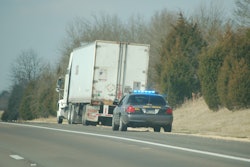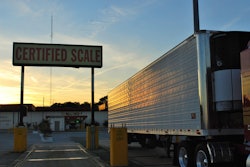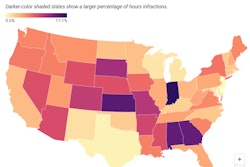The Trucking Law segment is a monthly feature on Overdrive, in which we pose commonly asked questions from truckers and owner-operators to legal experts. In this installment, attorney Paul Taylor goes into what is permissible to record time spent driving a truck as “personal conveyance” in hours of service. Find all Trucking Law installments via this link.
 Time spent driving your truck home, when not under dispatch or another business-related duty, can be logged as personal conveyance since you are off duty.
Time spent driving your truck home, when not under dispatch or another business-related duty, can be logged as personal conveyance since you are off duty.I frequently am asked when it is permissible to record time spent driving a commercial vehicle as “personal conveyance” on a record-of-duty status.
Although a log line designated as PC is a relatively new phenomenon, the permissible recording of personal use of a commercial vehicle as “off-duty time” has been around since I dispatched trucks while I was in law school.
 Paul O. Taylor is managing partner of Truckers Justice Center and has represented truck drivers for over 25 years. He can be reached at (855) 943-3518 or at TruckersJusticeCenter.com.
Paul O. Taylor is managing partner of Truckers Justice Center and has represented truck drivers for over 25 years. He can be reached at (855) 943-3518 or at TruckersJusticeCenter.com.You can use a truck to drive your family to church, run to the grocery store or take a fishing trip so long as you are not doing so at the direction of the employer. Determining compliance can be a little more fuzzy, though, when driving to or from shippers or receivers, or the carrier’s terminal.
Here are some common questions:
1. What is personal conveyance?
PC is the personal use of a commercial motor vehicle while off duty. You are off duty only if you are not responsible for performing work for the carrier at that time.

2. How far may I drive on PC?
You can drive as many miles or hours as you want, provided you are really off duty. If the carrier is asking you to record time spent transporting a load from Bangor, Maine, to Long Beach, California, as PC, you would be falsifying your log. Transporting a load at the direction of the carrier is “driving time” as defined by the hours of service regulations.
3. May I pass the terminal to make a delivery knowing I will run out of hours and then record time deadheading to the terminal as PC?
No. Time spent driving back to the terminal fulfills a business purpose, not a personal use.
4. May I record driving time as PC when the carrier is directing me to travel in the direction of my next pickup?
No. Again, this is for a business purpose.
5. What is the penalty if I record driving time as PC due to coercion by the carrier?
The carrier is violating the coercion rule, 49 C.F.R. Section 390.6, and could be subject to five to seven years in prison for the felony of intentional falsification of a log. Likewise, if you falsify your log in this way, you face a possible felony charge for not resisting the coercion. The better course is to resist the coercion and “blow the whistle” to law enforcement about the carrier.
6. May I record as PC time spent driving my truck home or somewhere else without having a dispatch?
Yes. In that circumstance you are off duty, provided you are not doing so for a business purpose at the instruction of the carrier.
7. What are my rights if I refuse my employer’s illegal instruction to record time under a load as PC?
The Surface Transportation Assistance Act prohibits retaliation against a driver for recording on-duty time accurately. STAA provides monetary and nonmonetary remedies for drivers against whom carriers have retaliated.
8. Does the carrier get to choose where I go to take my 10-hour break?
Motor carriers may, but are not required to, authorize drivers to use a truck while off duty for PC to take their FMCSA-mandated breaks. FMCSA recommends that carriers have a policy in place on what they allow regarding PC.










